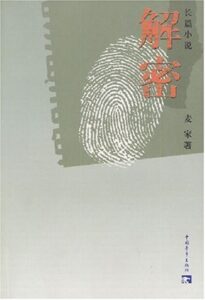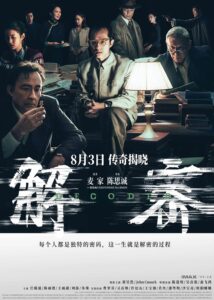Decoded
解密
China, 2024, colour, 2.35:1, 155 mins.
Director: Chen Sicheng 陈思诚.
Rating: 8/10.
Belated return to form by film-maker Chen Sicheng is a strongly written, subtly played period drama of an autistic young code-breaker and his US tutor/nemesis.
Nanjing, Oct 1944. The grandson of Cambridge university graduate Rong Youying, Rong Jinzhen (Yuan Jingui) is a socially awkward but mathematically brilliant 12-year-old boy who has been raised since birth in the Rong country mansion by an Austrian family friend of Rong Youying, Franz Auslander (Heinz Dieter Schweinsberg). Rong Jinzhen’s young mother died in childbirth and his father – Rong Youying’s wayward son, nicknamed Da Tou Gui (Big-Headed Devil) – also died young from fast living. As Franz Auslander has now died, Rong Jinzhen is visited by Rong Xiaolai (Wu Yanzu), maths professor at Zhijing university, Nanjing, who recognises the boy’s genius and takes him to live with his family in the city. The son of Zhijing university’s founder, Rong Xiaolai, 42, went to the US in 1928 and returned to China in 1937; he has a wife, Ye Xiaoning (Yu Feihong), 33, and a daughter, Rong Biyu (Feng Xueya), who’s almost 14. By the age of 16, Rong Jinzhen (Liu Haoran) is admitted to Zhijing university’s mathematics department and on his first day is recognised as a genius by Jan Lisiewicz (John Cusack), a Polish-born professor who adopts him as his special student. Though pressured by Communist Party friend Zheng (Chen Daoming) to decode a telegram that could help defeat the KMT and save lives, Jan Lisiewicz has always resisted becoming involved in politics, and urges Rong Jinzhen to follow his example. He then informs Rong Jinzhen that he has secured a job with MIT in the US and has arranged for him to accompany him. In Apr 1949 the two men, plus Jan Lisiewicz’s Chinese wife Fan Lili (Zhu Zhu), prepare to flee the city on the eve of its liberation by Comunist troops. But at the last moment Rong Jinzhen is shot and wounded by KMT agents, and Jan Lisiewicz and his wife (who is a relative of a KMT member) are forced to leave him behind. Five years later, in 1954, Rong Jinzhen is taken by Zheng – who remembered how Rong Jinzhen had once decoded a telegram that Jan Lisiewicz had refused to – to the top-secret code-breaking facility known as “701”, deep in the countryside. He’s soon promoted to “the real 701”, a department for top code-breakers within 701, and put on a team to crack the complex Purple Cipher, used by the US to help the KMT in Taiwan. The cipher was invented by Jan Lisiewicz, who is now working for the NSA and realises through letters they exchange that Rong Jinzhen is among those trying to crack it. Meanwhile, at the facility Rong Jinzhen goes on his first date with a girl, Zhai Li, aka Xiaomei (Ren Luyao), who also works there. Back in Nanjing, the now-adult Rong Biyu (Chen Yusi) sends a verbal message to him, via Zheng’s assistant Vasily (Wang Yutian), that she loves him. Rong Jinzhen manages to crack the Purple Cipher just in time to prevent the assassination of a CCP high-up in Hong Kong, and the Communists manage to get their hands on a Purple Cipher decoding machine. Beaten by his own student, Jan Lisiewicz is imprisoned by the US Secret Service pending an investigation. Rong Jinzhen proposes to Xiaomei and they marry. Then the 1960s arrive, many things change dramatically in Chinese society, and Xiaomei starts to realise she married an obsessive personality who’s being completely taken over by his work. And then he and 701 are faced with cracking the US’ even more complex Black Cipher, the latest invention of the now-released Jan Lisiewicz as a direct challenge to Rong Jinzhen.
REVIEW
After the serious misfire of his schoolboy-and-the-E.T. movie Mozart from Space 外太空的莫扎特 (2022), actor-turned-film-maker Chen Sicheng 陈思诚, 46, recovers his artistic (if not his box-office) credibility with Decoded 解密, a Cold War drama centred on a gifted young Chinese code-breaker at the (fictional) Unit 701 who, like his European university professor, inhabits a curious other-world of his own that teeters on the edge of madness. This is Chen at his best, with a well-tooled script, nuanced performances by a fine cast, and a kind-of-whodunit story that actually sustains its 2½-hour running time. The result took RMB334 million this summer – nothing compared with the billions hoovered up by his Detective Chinatown 唐人街探案 franchise (2015-21) but a very solid amount for an intelligent drama with limited appeal and young Chinatown regular Liu Haoran 刘昊然 in a seriously offbeat role.
 The film is adapted from the novel of the same name, published in 2002 (see cover, left), that was the first of three (unconnected) spy novels written by Mainland author Mai Jia 麦家 (pen name of Jiang Benhu 蒋本浒) in the early 21st century. The best-known of the three is the last, The Message 风声 (2007), which was made into a splendid (now classic) movie, with an all-star cast, in 2009. The second novel, In the Dark 暗算 (2003), is a virtually unfilmable collection of five stories centred (like Decoded) on Unit 701 but set in different time periods. The first two stories of that were the basis for a 2006 TV drama series, Plot Against 暗算; the first story was turned into a (bad) feature film, The Silent War 听风者 (2012), with Liang Chaowei 梁朝伟 [Tony Leung Chiu-wai] and Zhou Xun 周迅.
The film is adapted from the novel of the same name, published in 2002 (see cover, left), that was the first of three (unconnected) spy novels written by Mainland author Mai Jia 麦家 (pen name of Jiang Benhu 蒋本浒) in the early 21st century. The best-known of the three is the last, The Message 风声 (2007), which was made into a splendid (now classic) movie, with an all-star cast, in 2009. The second novel, In the Dark 暗算 (2003), is a virtually unfilmable collection of five stories centred (like Decoded) on Unit 701 but set in different time periods. The first two stories of that were the basis for a 2006 TV drama series, Plot Against 暗算; the first story was turned into a (bad) feature film, The Silent War 听风者 (2012), with Liang Chaowei 梁朝伟 [Tony Leung Chiu-wai] and Zhou Xun 周迅.
 Decoded was the first novel by Mai and his first to be translated into English (as Decoded). It was earlier made into a popular 41-part TVD, broadcast in 2016, directed by An Jian 安建 and starring Chen Xuedong 陈学冬 as the semi-autistic hero Rong Jinzhen (see poster, left). Chen’s adaptation radically condenses the section on Rong Jinzhen’s upbringing, joining the already socially awkward boy in autumn 1944 at the age of 12 – aka “Day 4,396” of his life, an annoying alternative to using hard dates that reflects to the boy’s amazing facility with numbers but means little to a casual viewer. Adopted into the family of a Rong relative who’s a maths professor at a Nanjing university, he becomes a member of the maths department within a few years, where his genius is mentored by a visiting professor from Poland, Jan Lisiewicz (US actor John Cusack). When Nanjing is liberated by the Communists and Jan Lisiewicz flees to the US with his KMT-linked Chinese wife, Rong Jinzhen is taken to the remote Unit 701, where he becomes a top code-breaker. This begins a kind of professional rivalry between himself and Jan Lisiewicz, who’s now working for the US’ NSA as its top code-maker.
Decoded was the first novel by Mai and his first to be translated into English (as Decoded). It was earlier made into a popular 41-part TVD, broadcast in 2016, directed by An Jian 安建 and starring Chen Xuedong 陈学冬 as the semi-autistic hero Rong Jinzhen (see poster, left). Chen’s adaptation radically condenses the section on Rong Jinzhen’s upbringing, joining the already socially awkward boy in autumn 1944 at the age of 12 – aka “Day 4,396” of his life, an annoying alternative to using hard dates that reflects to the boy’s amazing facility with numbers but means little to a casual viewer. Adopted into the family of a Rong relative who’s a maths professor at a Nanjing university, he becomes a member of the maths department within a few years, where his genius is mentored by a visiting professor from Poland, Jan Lisiewicz (US actor John Cusack). When Nanjing is liberated by the Communists and Jan Lisiewicz flees to the US with his KMT-linked Chinese wife, Rong Jinzhen is taken to the remote Unit 701, where he becomes a top code-breaker. This begins a kind of professional rivalry between himself and Jan Lisiewicz, who’s now working for the US’ NSA as its top code-maker.
Chen’s script, co-written with Canadian writer-director Christopher MacBride (The Conspiracy, 2012; Flashback, 2020), plays up the role of Lisiewicz and the two men’s mental battle-cum-relationship, as well as stirring in dream sequences to explain Rong Jinzhen’s declining sanity as he becomes immersed in the world of cryptography. Most of these sequences are strikingly composed (Rong Jinzhen chased by female comrades through a wheat field; he and a girlfriend walking on a giant chessboard; a huge walrus on a red beach), though they do come to over-dominate the human action during the film’s latter portion. The film’s message is that cryptography can easily drive you mad if you let it, especially if you try to approach it from both sides – as code-maker and code-breaker – which require different types of brains. It’s only peripherally an espionage movie or a portrait of China during the socially turbulent late 1940s, 1950s and early 1960s; the film goes out of its way not to refer to individual political movements during that time span.
Chen’s approach is also interesting, book-ending the film with an interview of someone who knew Rong Jinzhen well by a film-maker (played by Chen himself) planning a movie about the “unsung hero” who helped his country. Decoded has the feel of, and is directed like, a real biopic, which increases its authenticity and that of the main characters, even though they’re fictional. Added to which, the script takes its time, maintaining several characters on the edges of the main plot of the China-US cipher battles and Rong Jinzhen’s declining sanity, as well as not getting involved in the minutiae of ciphers and code-breaking. With its fantasy sequences, obsessive characters, and atmosphere of secrecy and mystery, Decoded could almost have been directed by Christopher Nolan.
In his most challenging role so far, baby-faced Liu, 27, who developed more personality during the run of Detective Chinatown, is good enough as the spacey Rong Jinzhen who lives in a world of his own that only a fellow maths obsessive like Jan Lisiewicz can penetrate. But it’s Cusack, in the latter role, who’s the big surprise. Despite performing in accentless American when he’s meant to be a Polish-born academic, the 58-year-old actor, who’s mostly made direct-to-video features during the past decade or so, gives an intense, quietly passionate performance as the prof who’s determined to show he can outwit his own pupil.
The script is strong enough for the film to pivot on Liu and Cusack, but it’s Mainland veteran Chen Daoming 陈道明, in a slyly quiet performance, who steals scene after scene as the enigmatic head of Unit 701. Among other roles, actress Chen Yusi 陈雨锶, 28, stands out as a cousin who’s in love with Rong Jinzhen – notably in a beautifully nuanced scene of her sending a verbal message to him via a middleman, typical of the film’s confidence in taking its time when it’s important. As the 701 colleague who sets her sights on Rong Jinzhen, and later wonders what she’s got, Xinjiang-born newcomer Ren Luyao 任璐遥, 27, is strong, as is Chinese American veteran Wu Yanzu 吴彦祖 [Daniel Wu] as the relative who takes Rong Jinzhen into his household.
As usual for a Chen production, the technical package is strong at all levels, with widescreen photography by Cao Yu 曹郁 (Forever Young 无问西东, 2018; The Eight Hundred 八佰, 2020), art direction by Han Zhong 韩忠 (The Wasted Times 罗曼蒂克消亡史, 2016) and Ma Xiaofei 马晓飞, and styling by Li Zhou 李宙 (The Eight Hundred) all avoiding a typical period look. The long-limbed, chordal score by UK composer Lorne Balfe (Looking Up 银河补习班, 2019; Ping Pong: The Triumph 中国乒乓之绝地反击, 2023) and US videogame scorer Kevin Riepl also fits the leisurely running time. As usual, Chen is loathe to let one of his films end, and adds a totally unnecessary coda featuring himself. But it’s one of only a small number of flaws in an otherwise assured production.
Both in the novel and the film, the Polish professor’s surname is spelled Liseiwicz, an etymological impossibility that has been corrected in this review.
CREDITS
Presented by Shanghai CMC Pictures (CN), As One Pictures (Shanghai) (CN), Tianjin Maoyan Weiying Cultural Media (CN), Shanghai CMC Pictures Beijing Branch Office (CN), Shanghai Taopiaopiao Movie & TV Culture (CN), Beijing Happy Pictures (CN), Media Asia Zexin Films (Shanghai) (CN). Produced by As One Pictures (Shanghai) (CN).
Script: Chen Sicheng, Christopher MacBride. Novel: Mai Jia. Photography: Cao Yu. Editing: Tang Hongjia. Music: Lorne Balfe, Kevin Riepl. Music supervision: Yu Fei. Art direction: Han Zhong, Ma Xiaofei. Costumes: Chen Dian. Styling: Li Zhou. Sound: Huang Zheng, Zhang Jian. Action: Fu Xiaojie. Visual effects: Wei Ming, Li Shuai, Cai Meng. Scientific advice: Zhao Yanfeng. Executive direction: Zhang Zhe.
Cast: Liu Haoran (Rong Jinzhen), John Cusack (Jan Lisiewicz), Chen Daoming (Zheng), Wu Yanzu [Daniel Wu] (Rong Xiaolai/Xiaolili), Yu Feihong (Ye Xiaoning), Chen Sicheng (interviewer), Ren Luyao (Zhai Li/Xiaomei, Rong Jinzhen’s wife), Chen Yusi (Rong Biyu), Wang Yutian (Vasily), Zhou You (Yan Shi), Zhu Zhu (Fan Lili, Jan Liseiwicz’s wife), Cao Cuifen (adult Rong Biyu), Wu Yanshu (older Xiaomei), Xu Huanshan (older Vasily), Wang Baoqiang (Bing, codebreaker in sunglasses), Xiao Yang (The Chess Nut), Pan Yueming (Qian, professor), Ouyang Na’na (intelligence officer), Gu Jiacheng (student), Qiu Xinzhi (Taiwan general), Liu Jin (government minister), Andy Friend (McDonald, NSA officer), Zhou Yemang (Zeng, department head), Wang Longzheng (Ma, director), Yuan Jingui (young Rong Jinzhen), Feng Xueya (young Rong Biyu), Heinz Dieter Schweinsberg (Franz Auslander).
Release: China, 3 Aug 2024.
